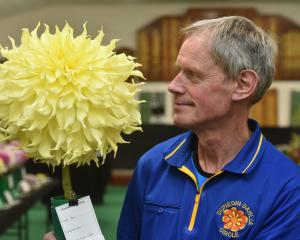Spending hours tracking people who are trying to evade police forms part of a physically demanding yet rewarding role for police dog handler Constable Alan Duncan.
Const Duncan, who has been in the police for nine years, graduated with German shepherd Brook from the Police Dog Training Centre in Trentham in July last year.
''We think they [police dogs] are one of the most vital parts of the police.
"Their tracking capability is probably our biggest asset. We find people that we couldn't otherwise have caught.
"It's all on them. We just get towed along for the ride and look good if the dog has had a successful track,'' he said.
Based at the South Dunedin Police Station, Const Duncan is one of three general purpose handlers.
Brook, who is also trained for Armed Offenders Squad duties, is Const Duncan's first operational dog.
''She's quite a cool dog. She's got heaps of character and keeps me on my toes. She is pretty clever at what she does.
"Brook is so accurate and honest. The dog can't lie, it goes where the scent is. If they can't smell it they won't go. We have to go with their nose,'' he said.
While the pair have had many successful and unsuccessful tracks, Const Duncan has ''never met anyone quicker'' than Brook.
''The dog acts as a deterrent, as well. A lot of the time, once people know the dog is coming, they will give up. I haven't met anyone who is quicker than Brook yet.
"Operationally, it's hard for them when they don't catch someone ... they don't know why they haven't had a successful track,'' he said.
Const Duncan said it was the responsibility of each handler to maintain their dog to a certain standard. Each week, handlers and their dogs have training sessions and they are re-certified every year.
''Our final course involves testing on tracking, criminal work (biting), preventing people from escaping and apprehending a fleeing offender, searching exercises and obedience.
"Most days we will do something with the dog to try and maintain their level and to improve them. It's a constant job. My days off are her days off.
"If we are at home, she will be in her kennel. It's like a battery charger for them. When we do go to work she is excited to try and catch someone or to do some training.
"She is always interested and gets her fun at work,'' he said.
At the training centre in Trentham, dogs are put through three courses, an initial, intermediate and a final.
At any stage they can be pulled out of the course and the reason determines their future.
Some are re-homed as pets and some may go to the army, corrections or aviation security, where they are trained as general purpose, drug or explosive detection dogs.
Const Duncan said he had one of the ''best jobs'' in the police.
''When a job comes in that they need a dog for, they wait for us to get there so we can do what we need to first.
"We get to have all the fun at the start. Everyone picks up the ball after that.
"Different departments within the police have their own role to play. That's what interested me,'' he said.
Working near Fox Glacier as part of a team to assist with a homicide inquiry is the furthest the pair have travelled.














